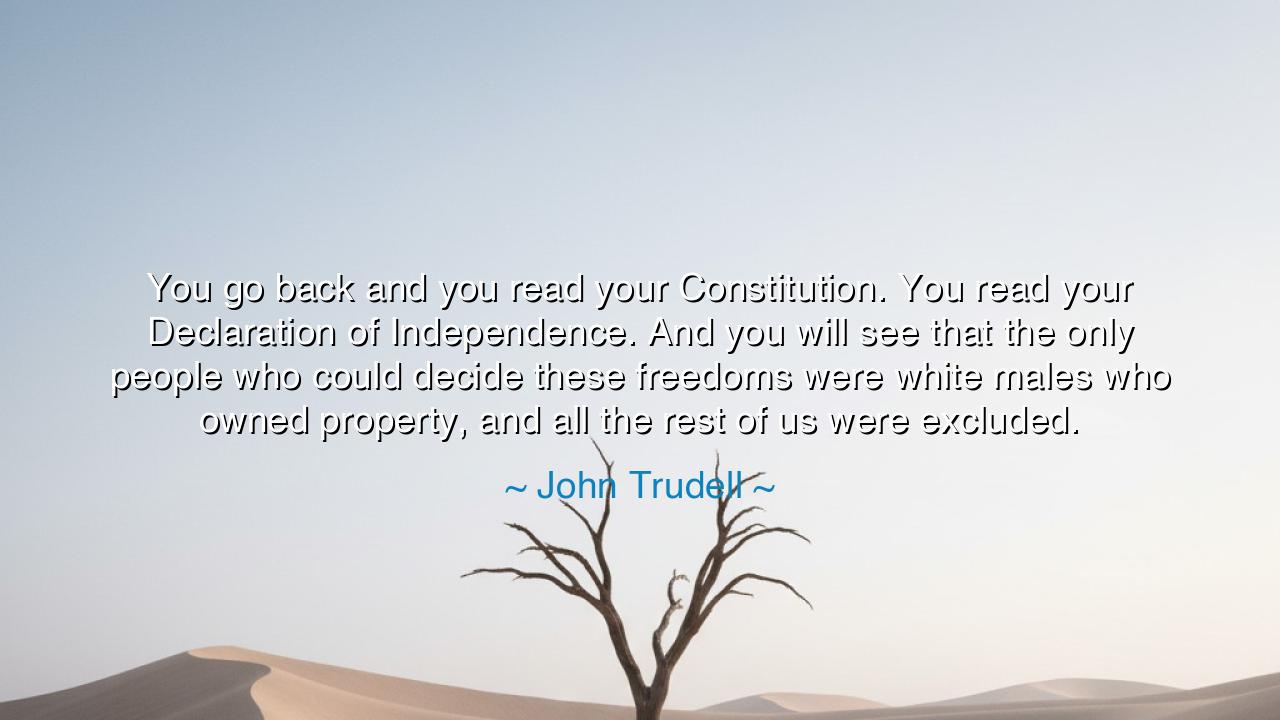
You go back and you read your Constitution. You read your
You go back and you read your Constitution. You read your Declaration of Independence. And you will see that the only people who could decide these freedoms were white males who owned property, and all the rest of us were excluded.






The words of John Trudell cut like a blade through the veil of myth, revealing the truth beneath the shining fabric of American ideals. When he said, “You go back and you read your Constitution. You read your Declaration of Independence. And you will see that the only people who could decide these freedoms were white males who owned property, and all the rest of us were excluded,” he spoke not in bitterness, but in awakening. His voice carried the grief and wisdom of the oppressed, the dispossessed, the forgotten — those whose names were not written in the founding charters of freedom. In those sacred documents that proclaimed liberty, many were left in silence. Trudell’s words remind us that truth, though buried beneath centuries of reverence, still breathes in the ashes of the past.
To understand his lament, one must return to the birth of the republic, when men gathered beneath the banner of liberty to forge a new world. They spoke of unalienable rights, of life, liberty, and the pursuit of happiness. Yet when the ink dried, the promise was not for all. It was written by the few, for the few — a circle of power drawn tightly around property and privilege. Women had no voice. Enslaved people were bound in chains. The Indigenous, whose lands formed the soil beneath that new flag, were denied humanity itself. Freedom was declared universal, yet practiced selectively — a contradiction that has haunted the nation’s soul ever since.
John Trudell, a Native American activist and poet, knew this wound intimately. Born of the land that had been taken, he spoke not as an outsider, but as one whose ancestors had felt the crush of “freedom’s” march. To him, the Declaration and the Constitution were mirrors — beautiful in form, but reflecting only one kind of face. He saw that what America called liberty had been built upon layers of exclusion, and that until the foundation was acknowledged, the house would never stand whole. His words call not for destruction, but for reckoning, for a remembering of who was silenced when freedom was proclaimed.
Consider the story of Sojourner Truth, a woman born into slavery who became one of liberty’s truest voices. She stood before white audiences in the 19th century and thundered, “Ain’t I a woman?” reminding them that the rights men claimed as self-evident had never been extended to her. Like Trudell, she looked upon the founding texts and saw absence — her body counted as property, her humanity denied. And yet, through her courage, through her voice, the meaning of freedom began to expand. History, after all, is not a single act of writing, but a long rewriting — a dialogue between the written word and the living soul.
Trudell’s message is not to despise the founding fathers, but to see them truthfully — as men bound by their time, limited by their own interests. He urges us to read the sacred texts not as final, but as flawed beginnings. The Declaration of Independence and the Constitution were seeds, but the soil of justice must be tended by every generation that follows. Freedom, he reminds us, is not inherited by birthright; it is earned through awareness, compassion, and struggle. To ignore those once excluded is to let the garden wither.
In the style of the ancients, let this be said: a nation that forgets the shadows of its own dawn cannot stand in the light. If the scrolls of law and liberty were first written by a few hands, then let the many now continue the writing. The ink of the present must correct the omissions of the past. The work of freedom is not in monuments or anniversaries, but in the daily act of seeing each other as fully human. Every citizen must become both historian and healer — remembering, mending, and expanding the meaning of “we the people.”
So, let this be the lesson: read not only the words of the past, but the silences between them. Seek the voices that history overlooked. Do not be content with inherited definitions of freedom; build your own, wide enough to include every soul. When you see injustice, do not turn away — speak, as Trudell did, with clarity and fire. For liberty is not a gift given once, but a covenant renewed through truth.
And the practical path is this: learn your history, but live your humanity. Question what you are told is complete. Lift the fallen, listen to the forgotten, and use your freedom to expand the circle that once excluded so many. Only then will the words of the Declaration and the Constitution breathe as they were meant to — not as the property of a few, but as the living promise of all.






AAdministratorAdministrator
Welcome, honored guests. Please leave a comment, we will respond soon